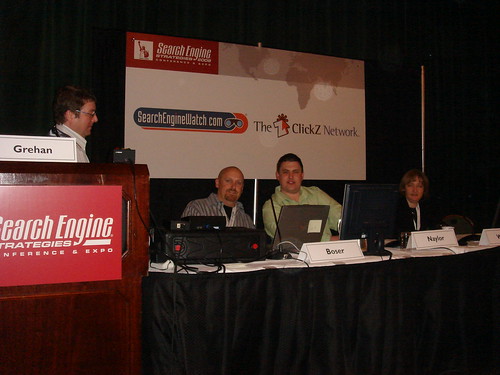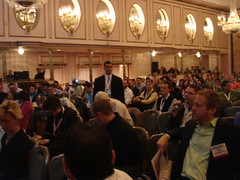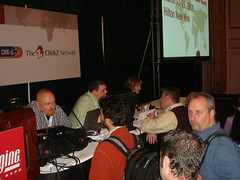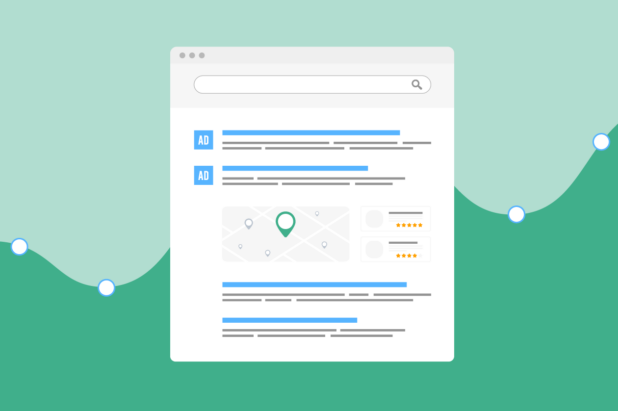Organic Listings Forum with Mike Grehan moderating and Jill Whalen, Dave Naylor and Greg Boser on the panel. Here we have an all star SEO cast available to answer questions about organic SEO.
Mike starts out with a nod to St Patrick’s day. During introductions Greg says he’s a reformed black hat spammer.
Audience: To what extent does Google use user data and behavior and how relevant is PageRank?
Greg: PageRank is irrelevant. It’s not important the way it used to be. It’s important to get crawled and how often you get crawled. It’s “link juice”. Use no follow to sculpt your PageRank.
Dave: Getting links from high PageRank sites isn’t what it was. The more authority you have, the more “bonus” features you’re going to get from Google.
On user data, it’s more relevant for universal search results. Thinkgs Feedburner data is useful for getting a blog indexed.
Jill: PageRank is important. Not toolbar PageRank but the “real” PageRank score. Don’t put much stock into toolbar PageRank.
As for user data, Google is going to collect and use data where ever they can and probably do.
Mod Mike: What you should do is not ask a SEO about PageRank, ask a mathematicion. Will PageRank work in real time? Answer is likely no.
Every search engine knows that if you create a web site for a thing, optimize it and get links and rank highly, that users clicking on a link in the search results and then click the back button in 5 seconds, that the site isn’t going to go down in rankings. User data is certainly being used.
Audience: Are blogs outdoing web sites? If so, will it continue?
Dave: The thing about blogs is the platform they’re published on. Blogs are not the silver bullet, they’re a supplement, Same as news feeds and social media exposure. Those kinds of things will give you benefits besides human traffic.
Mod Mike: Can you change what your blog ranks for?
Dave: Yes, in seconds, its amazing. Tells story about getting a screen shot of Google ads coming up for child pron and how now that screen shot ranks #1 on Google images for “child pron”
Jill: Blogs are a great way to establish yourself as an expert in your field. You need to actually write about interesting things, be creative. Don’t write about what everyone else is writing – like in the SEO industry. Have your own voice and be different.
Greg: The original question was whether blogs are outpacing regular sites. Sites with RSS feeds are outpacing sites without feeds. Blogs are about a distribution chain for content. That distribution attracts links.
The more authoritative your site is, the more on page factors are used.
Dave: Notes the number of laptops being used by audience. Web site owners don’t come to a conference and write articles. Bloggers don’t care so much about keeping people on the site, but more about expressing opinions.
Mod Mike: For a long time the signals search engines followed were about key words. Now it’s not just about static pages, It’s more about activity.
Relates a story about shooting a video and uploading it to YouTube, MetaCafe and then submitting it to social media sites. Within 2 hours it was showing in Google rankings.
Audience: There’s a lot on the message boards about paid links. How can Google tell if it’s a paid link?
Greg: This is the biggest joke in our industry. If you’re selling the links as part of a network, the search engine will spy – join the network and torch everyone in the network.
If you negotiate deals on your own, those links are not typically algorithmically detectable. Greg likes to go to AdBrite and look for blogs looking for advertisers who want ads that are not currently showing any. Then approach them directly to buy an ad and tell them they’ll get more $ because AdBrite isn’t taking a cut.
Mod Mike: THere’s a footprint of concern if all your links are coming from PR 5 or higher, because that’s not natural.
Greg: Typically, we will fade the paid links out.
Dave: If you sell links robots.txt archive.org out.
If his prospects want to buy links, they won’t do it. Too many risks – Google has ruined the link buying market. Buying links is the new blackhat blog spam. Matt Cutts said recently, PageRank is secondary. Focus on building internal link popularity.
Jill: If the links on the page don’t make sense, search engines can tell. There are footprints that engines can detect. Make deals one to one. We don’t buy links ourselves.
Mod Mike: Sounds to me like you do buy links Jill. 🙂
Audience: How are search engines treating top level domains? Is preference given to certain domains? .com, .net, .org
Greg: I would never use .info. Those are spammer domains. I wouldn’t use anything but .com, .net, .org
Dave: We have a problem in the UK with something called Google and it has to do with geo targeting. A search for football in the UK shows american football. When he goes to Google.com there are no results for soccer. On Google.ca it’s a mix of UK football and American football.
It’s important that if you have UK content for a UK audience, to have a .co.uk domain.
Mod Mike: Talks about a friend buying thousands of Chinese domains and thowing up millions of pages.
Audience: Talk more about PR sculpting with nofollow
Greg: It’s interesting that Matt Cutts coined the phrase PageRank sculpting. If you look at the toolbar PR, don’t put a ton of credibility into it. But it can give you some indication if the site is trusted. If the site is around 6 months, been through a few PR updates and the interior pages are gray, then you may want to do some PageRank sculpting.
Dave: Explains nofollow. People complained about blog spamming. Nofollow is a attribute added to link code that tells search engines not to trust or follow the site being linked to. ie, links dropped in comments on blogs.
Mod Mike: WHy do you use nofollow on your own site
Greg: Used to think it wasn’t a good idea but after hearing Matt Cutts say it was a good thing, a good tool to use.
Mod Mike: Nofollow used to be about not trusting links and now it’s a good thing
Dave: Nofollow is more like robots.txt – it’s not about don’t trust, it’s about don’t pass link juice.
Jill: Why not just use robots.txt?
Greg: Because robots.txt doesn’t stop the passing of PageRank. No follow your pages like terms of use, etc to keep PageRank within the pages of your site that you want to rank.
Dave: Be careful, you can really messup your site with an improper nofollow implementation. It’s tool to be careful with and be sure to stay up to date with it.
Jill: If you’re nofollowing the privacy policy . I don’t see any reason for those kinds of pages not to rank.
Greg: Say a home page has 30 links and 20 of them don’t bring any traffic. There are pages that are great for users, but not very useful algorithmically. Example is a mashup page drawing in a lot of data from different sources. Google doesn’t typically rank that kind of content well. It may make sense to nofollow that content and focus on passing PageRank to your “money” pages.
Audience: How important is it to incorporate a keyword into your domain name or URL?
Dave: It’s a big mistake.
Jill: You don’t want it to be keyword-keyword. Branding is important.
Greg: It depends what your goals are. Wouldn’t use it for branded terms.
Jill: Don’t go changing your existing site urls just to add keywords. If you do make changes, make sure you 301 redirect.
Greg: It can help with clickability. If users see words in the url that give an indication of what the page is about, it can be helpful to motivate users to click.
Be sure to visit TopRank’s Flickr set for SES New York Photos, updated every few hours.





